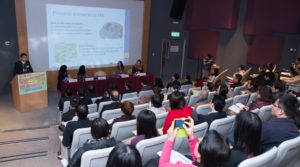(Hong Kong, 15 December 2014) The 7th Annual Palliative Care Symposium for Health Care Workers in Chinese Population, jointly organised by the Faculty of Medicine of The Chinese University of Hong Kong (CUHK); Li Ka Shing Faculty of Medicine of The University of Hong Kong (HKU), The Hong Kong College of Family Physicians and the Li Ka Shing Foundation ‘Heart of Gold’ Hong Kong Hospice Service Programme, was held at the Jockey Club School of Public Health and Primary Care Building in the Prince of Wales Hospital last Saturday (13 December). Professor Francis Chan, Dean of CUHK’s Faculty of Medicine; Professor David Wong, Associate Dean (Human Capital) of Li Ka Shing Faculty of Medicine, HKU; Dr Ruby Lee, President of The Hong Kong College of Family Physicians; Dr Cheung Wai Lun, Director (Cluster Services) of Hospital Authority and Dr Katherine Lo, Senior Project Manager of Li Ka Shing Foundation officiated the opening ceremony of the Symposium.
The current palliative care service is mainly hospital based, with out-patient clinics and also home care outreach teams to serve patients who have difficulty to attend the hospital clinics. With a rapidly ageing population and increasing cases of cancer and other chronic illness, the demand for care for patients in their homes and outside-hospital facilities is ever increasing. It is opportune to explore the further development of the palliative care service at the community level. With this in mind, this year’s Symposium is themed on “Palliative Care in the Community” and provides a platform for practitioners to discuss the way forward of local palliative care services.
With the importance of launching palliative care services in the community, Professor Francis Chan, Dean of CUHK’s Faculty of Medicine, observed that some patients preferred staying at home in the pre-terminal period with their family members. “If the community-based palliative care service is available, patients will be able to receive hospice care at a familiar environment and live with dignity and comfort in their last stage of life.”
Professor David Wong, Associate Dean (Human Capital) of Li Ka Shing Faculty of Medicine, HKU, said “In view of the growing demand of the medical services due to ageing population and social development, the medical system in Hong Kong is heavily burdened. By developing community palliative care services, it will not only reduce the burden imposed on the medical system, but will also benefit the patients by offering better care to them.”
Highlighting the vital role of family physicians in hospice care, Dr Ruby Lee, President of The Hong Kong College of Family Physicians, said, “In palliative care, problems arise from a complex mix of physical, social and psychological factors involving both the patients and their carers; the emphasis changes from prolonging life to relieving symptoms and improving quality of life. Family physicians have long term continuous relationship with patients, providing holistic care for them through communication and multidisciplinary team work.”
Dr Cheung Wai Lun, Director (Cluster Services) of Hospital Authority, noted that with the aim to provide holistic care to patients, Hospital Authority (HA) had been providing palliative care services with a comprehensive service model for terminally-ill patients and their families through a multidisciplinary team of professionals. Currently, there are 16 hospitals under HA providing palliative care services. Moreover, in collaboration with the Li Ka Shing Foundation, 10 palliative care day centres were jointly established to provide services and support to patients and their families.
One of the keynote speakers, Dr Hong Tin Chak, Specialist in Family Medicine, Hong Kong Sanatorium & Hospital, said that from overseas experience, community end-of-life care was coordinated by the general practitioner, together with the multidisciplinary team, to provide continuing care to patients for broader service coverage and to help reduce the financial cost of lengthy stays in hospital. However, we need a more popular family doctor concept and optimisation of the current healthcare system to enable family physicians to work with hospital specialists and the home care team to give the best outcome of community palliative care in Hong Kong.
In addition, Professor Samuel Wong, Professor and Head of Division of Family Medicine and Primary Health Care, The Jockey Club School of Public Health and Primary Care, Faculty of Medicine, CUHK reviewed the use of mindfulness based interventions with respect to palliative care with a focus on its effects on the improvement of mental well-being and quality of life. He said that there was evidence to support the use of mindfulness training in reducing pain, improving quality of life and reducing psychological morbidity among people with cancer and other life threatening diseases. Studies had also shown that mindfulness based interventions may benefit informal caregivers who may need to look after people with disabling conditions. Professor Wong suggested that more local research could be carried out to examine these effects on the local population who are receiving palliative care.
Local medical practitioners, nurse consultants and occupational therapists also shared their experiences and exchanged views with some 100 healthcare professionals on the topics of “Delivering Palliative Care in the Community” and “Initiating DNACPR and Advance Care Planning in Outpatient Setting”.
The organisers are indebted to the continued support from the Li Ka Shing Foundation and their sponsorship of this symposium. The Foundation aims at contributing to society by helping those in need to build a better life. Its munificent support in health care has benefited countless patients in Hong Kong, Mainland China and worldwide. In 1998, the Foundation pioneered free hospice care services in the mainland with the establishment of the ‘Heart of Gold’ Hospice Service Programme. The Foundation’s total donation of over HK$600 million has supported 42 hospice centres in the Mainland and Hong Kong, serving 20,000 patients annually and benefitting nearly 170,000 cancer patients.
Media Enquiries: Ms. Brenda Hung, Communications Manager, CUHK Faculty of Medicine (Tel: 2632 2847)

